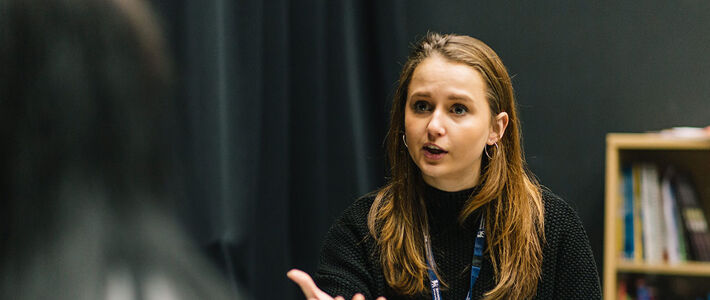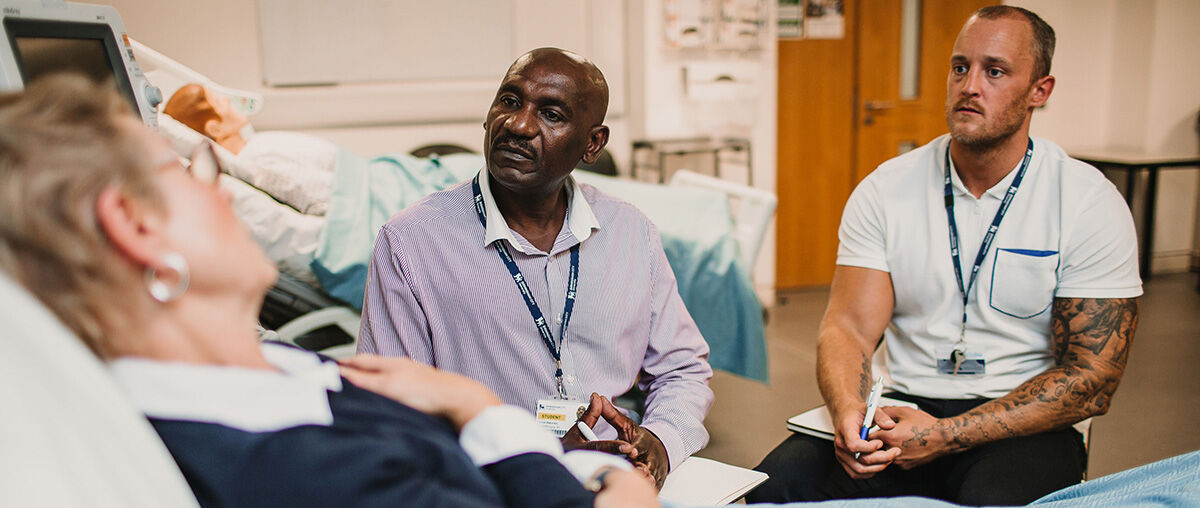
Education - PhD
Currently viewing course to start in 2026/27 Entry.
Our Centre for the Study of Practice and Culture in Education (CSPACE) is active in a wide range of research in education policy and practice, and engages in education research across all age phases, from Early Years, through Primary and Secondary Schools, to FE and Post-16, Higher Education and lifelong learning.
- Level Postgraduate Research
- Study mode Full Time/Part Time
- Award PhD
- Start date September 2026, February 2027, May 2027
- Subject
- Location City Centre
This course is:
Open to International Students
Overview
Our Centre for the Study of Practice and Culture in Education (CSPACE) is active in a wide range of research in education policy and practice, and engages in education research across all age phases, from Early Years, through Primary and Secondary Schools, to FE and Post-16, Higher Education and lifelong learning.
What's covered in this course?
- Research students in Education will join a thriving research community and be part of one of the University’s Research Centres of Excellence.
- We offer supervision for study either part-time or full-time towards a PhD degree.
- If you are accepted for a PhD, there is a University-wide taught course in research methodologies, and you will be assigned to a director of studies, and at least one second supervisor will also be appointed.
- You will have access to a dedicated research room for postgraduate researchers
- You’re encouraged to publish in collaboration with your supervisors and to take part in research conferences and events
Research Interests
Research interests
Areas of interest in which staff are currently active include:
- Assessment
- Creativity
- Childhood Studies
- Early Years
- Post-16 Provision
- Education Policy
- Music Education
- Professional Learning and Development
- Workplace Learning
- Student experience in Higher Education
- Teaching and Learning in Higher Education
- Management and Leadership in Higher Education
- Historical Research into education
We welcome applications in these and other areas of expertise in education.
Fees & How to Apply
UK students
Annual and modular tuition fees shown are applicable to the first year of study. The University reserves the right to increase fees for subsequent years of study in line with increases in inflation (capped at 5%) or to reflect changes in Government funding policies or changes agreed by Parliament. View fees for continuing students.
Award: PhD
Starting: Sep 2026
- Mode
- Duration
- Fees
- Full Time
- 3-4 years
-
TBC
- Part Time
- 4-7 years
-
TBC
Award: PhD
Starting: Feb 2027
- Mode
- Duration
- Fees
- Full Time
- 3-4 years
-
TBC
- Part Time
- 4-7 years
-
TBC
Award: PhD
Starting: May 2027
- Mode
- Duration
- Fees
- Full Time
- 3-4 years
-
TBC
- Part Time
- 4-7 years
-
TBC
International students
Annual and modular tuition fees shown are applicable to the first year of study. The University reserves the right to increase fees for subsequent years of study in line with increases in inflation (capped at 5%) or to reflect changes in Government funding policies or changes agreed by Parliament. View fees for continuing students.
Award: PhD
Starting: Sep 2026
- Mode
- Duration
- Fees
- Full Time
- 3-4 years
-
TBC
Award: PhD
Starting: Feb 2027
- Mode
- Duration
- Fees
- Full Time
- 3-4 years
-
TBC
Award: PhD
Starting: May 2027
- Mode
- Duration
- Fees
- Full Time
- 3-4 years
-
TBC
If you’re unable to use our online application form for any reason, please get in touch.
Entry requirements
| Essential |
|---|
|
Applications for research degrees are normally assessed by interview using the following criteria: |
|
That the Faculty is able to provide the appropriate supervisory expertise and resources for the proposed topic |
|
That the proposed research seems likely to satisfy the academic requirements of a research degree |
|
That the proposed research is feasible in practical terms |
|
That you seem likely to be able to cope with the academic demands of a research degree |
|
PhD applicants will normally be expected to hold a Master's degree in a relevant area |
You must complete a research proposal and upload this as part of your application. Please note that we will not be able to process your application without having received your research proposal.
Course in Depth
Research Practice
Your PhD will begin with a short course to complete a Postgraduate Certificate (PgCert) in Research Practice; this takes eight weeks. Following your PgCert, your PhD will be based on supervision meetings, which normally take place fortnightly basis for full-time students and monthly for part-time students.
.
Why study a PhD?
Are you keen to contribute innovative ideas to your field? Looking to solve problems, discover something new, and make a difference to society?
We have a vibrant research community here at Birmingham City University, with many talented postgraduate researchers developing and exchanging knowledge across their fields.
Conducting a PhD will allow you to develop cutting-edge research in your area of interest, with the support of your research supervisor and fellow research community.
The PhD Journey
Normally a PhD journey begins with a research proposal followed by undertaking an extensive literature review on the topic and research questions identified. Time is spent developing suitable research methodology and exploring appropriate theory. Data is normally collected as part of extensive field work and enquiry.
The data is then analysed and discussed at length with conclusions drawn which relate to the originality of the work. A Thesis is produced as the result of the research which is normally 80,000 words. Towards the end of the journey the student undertakes a viva examination which is based on the Thesis. The Thesis and viva are both taken into consideration for the award of doctorate.
For the first six months of your PhD you will undertake the PGCert in Research Practice, which is a taught and compulsory part of the PhD programme. You will meet with your supervisors and attend classes every week. This is an essential part of the PhD which will help you to get your research started and set you up for the rest of your PhD journey.
The PGCert programme covers literature review and research methods which are specific to your faculty. The outcome of the PG Cert will be a detailed and considered research proposal which will take you forward with your work.
How the PhD is assessed
The criteria to be awarded a PhD is to make a ‘unique contribution to knowledge.’ Whether a student has achieved this is determined by a panel of experts, including internal and external academics. The panel will assess the student’s written thesis, and the student’s oral defence of that thesis in a viva voce.
For more information, visit our PhDs section.
Employability
Employment Opportunities
The PhD award from Birmingham City University is a well-established and valued professional qualification within the education sector. Typical careers include school management, working in further or higher education, or educational consultancy.
Facilities & Staff
Our facilities
Our School of Education and Social Work is based at our City South campus in leafy Edgbaston.
We’ve spent £41million expanding the education facilities at City South. These facilities offer hands-on practical experience, replicating the spaces you will come across in professional practice. Alongside classrooms and lecture theatres, we also have a range of specialist teaching and learning spaces for specific subjects including science, design and technology, drama and physical education.
As well as subject-specific rooms, our facilities include the Primary Innovation Lab, which houses £24,000 worth of LEGO. This room is a special resource for our education students, offering an innovative and creative way to approach subjects across the curriculum – from computing to English, mathematics to art. The lab responds to research that children and young people learn best from practical experience.
Our Social Work students have access to a home environment room and mock hospital wards which offer an opportunity to gain experience of working with service users in different situations.

Computer facilities
The Seacole building has two open-access IT Suites which offer PCs, printers, photocopiers and scanners. There is also an IT Helpdesk for quick and easy help with your computing or internet issues.
Our PCs utilise the latest Intel i5 core technology, all with:
- Fast (unrestricted) internet connectivity
- Ability to save files to USB, DVD & CD
- Microsoft Office software
- Research and statistical software
- Storage space which can be accessed from any PC across the University and from home
Our PCs are also designed to support students who may have difficulties with reading and writing, featuring specialised software with zooming/magnification and screen reading capabilities, which may also be customised for individual student needs.
In addition to desktop PCs, we also offer a laptop loan facility, allowing students to borrow a laptop for up to six hours while on campus.
Our staff
Dr Alex Wade
Senior Research Fellow
Alex's work is at its best where videogames meet society. Using theory to explore these intersections he looks to the histories of games to explore the formation of society during the Cold War and beyond. Of particular interest in his work are concepts of space, time, consumption as a function of production and the role of science and...
More about Alex
